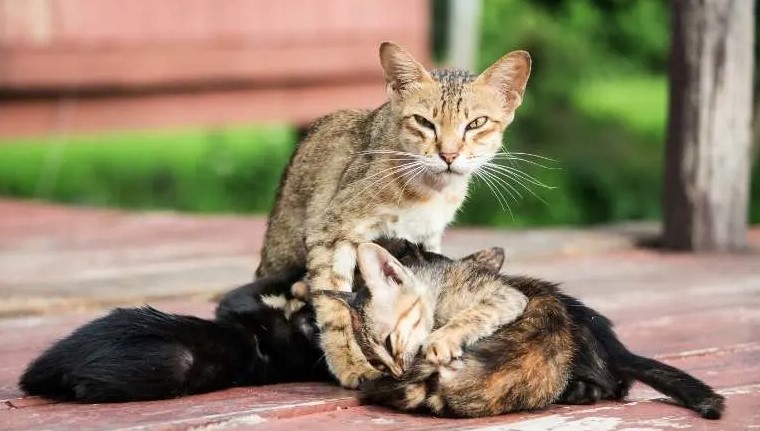If you are a pet lover, you probably love kittens and their playful antics. But it’s natural to have concerns about their safety, especially when it comes to tomcats. In this comprehensive guide, we’ll answer the burning question: At What Age Are Kittens Safe from Tomcats? We’ll also explore the fascinating world of cat behavior and provide tips to ensure the safety of your kittens.

Understanding Tomcats and Kittens
Before we dive into the age at which kittens are safe from tomcats, let’s take a closer look at these two feline counterparts.

Tomcats: The Alpha Males
Tomcats, also known as tomcats, often have a reputation for being independent and sometimes territorial. They have a strong instinct to protect and dominate their territory. This territorial behavior can sometimes be dangerous for kittens, especially when they are very young.

Kittens: The Precious Babies
Kittens are irresistibly cute, but they are also vulnerable when they are born. They depend on their mother for warmth, nourishment, and protection in the first weeks of their lives. As they grow, they become more active and curious, which is when you start thinking about keeping them safe around tomcats.

At What Age Are Kittens Safe from Tomcats?
The safety of kittens around tomcats depends on several factors, including the age of the kittens, the tomcat’s behavior, and your supervision. Let’s break down the major milestones in a kitten’s life and discuss when they’re safer around tomcats.
Newborn Kittens (0-2 Weeks)
During the first two weeks of their lives, newborn kittens are incredibly fragile. They are blind, deaf, and completely dependent on their mother. At this stage, they are not protected from tomcats or any potential threats. Mother cats are usually very protective during this period and keep their kittens separate in a safe nest.
Tip: Ensure the mother cat has a quiet and secure place to give birth and care for her kittens.
Neonatal Kittens (2-4 Weeks)
As kittens reach 2 to 4 weeks of age, they begin to open their eyes and ears and become more aware of their surroundings. However, they are still vulnerable and should not be exposed to tomcats without supervision. The mother cat remains alert during this time.
Tip: Limit interaction with tomcats until kittens are older and more mobile.
Young Kittens (4-8 Weeks)
Between 4 and 8 weeks, kittens become more active and curious. They begin to explore their environment and may even begin playing with their littermates. At this stage, they are still not completely immune to tomcats, but they are better equipped to move away from potential danger.
Tip: Keep a watchful eye on kittens and supervise any interactions with adult cats.
Older Kittens (8-12 Weeks)
When kittens reach 8 to 12 weeks of age, they are becoming more independent. They are better at defending themselves, and their mother may begin to wean them. At this point, they are generally safer around tomcats, but supervision is still recommended.
Tip: Gradually introduce kittens to other cats to ensure a smooth transition.
Adolescent Kittens (12+ Weeks)
Once kittens are 12 weeks old or older, they are usually immune to tomcats, as they are approaching adulthood themselves. They have developed skills to handle themselves and navigate social interactions with other cats.
Tip: Continue to monitor their behavior to ensure they adapt well to adult cat dynamics.
Ensuring a Safe Environment
While knowing at what age kittens are safe from tomcats is crucial, creating a secure environment for them is equally important.

Here are some additional tips to keep in mind:
- Spaying and Neutering: Consider spaying or neutering your cats to reduce territorial and aggressive behaviors in adult tomcats.
- Supervision: Always supervise interactions between kittens and adult cats until you are confident that they can coexist peacefully.
- Separation: If you have concerns about your tomcat’s behavior, consider keeping them separated from the kittens until they are older and more independent.
- Introductions: When introducing kittens to adult cats, do so gradually and in a controlled environment. Monitor their interactions closely.
- Socialization: Socialize your kittens by exposing them to various people, animals, and experiences from a young age. This helps them develop confidence and adaptability.
The Disturbing Truth: Do Male Cats Kill Kittens?
As we wrap up our discussion of when kittens are safe from tomcats, it’s important to answer a related question: Do male cats kill kittens? Although it is relatively rare for male cats to intentionally harm kittens, it can happen under certain circumstances. Male cats can become aggressive if they feel threatened or if the kittens are not their own.

To ensure the safety of your kittens, it’s crucial to follow the guidelines mentioned earlier and monitor interactions between male cats and kittens closely.
Resources & References
For more information on feline behavior and kitten safety, consider exploring the following resources:
Recommended Articles
Do Male Cats Kill Kittens? (Video)
You can also watch the following YouTube video for additional insights:
In conclusion, understanding when kittens are safe from tomcats is essential for ensuring the well-being of your feline family. By following these guidelines and staying informed about feline behavior, you can create a safe and harmonious environment for your kittens to thrive.
FAQs – Kittens Safe from Tomcats
Is my kitten safe from Tomcats?
Yes, you can keep your kitten safe from tomcats by taking some precautions.
How to keep my kitten safe from tomcats?
You can keep your kitten safe from tomcats by keeping them indoors, spaying or neutering them, and supervising them when they are outdoors.
How do I spay or neuter my kitten?
To spay or neuter your kitten, you will need to take them to a veterinarian.
How much does it cost to spay or neuter a kitten?
The cost of spaying or neutering a kitten will vary depending on your location and the veterinarian you choose.
What are the benefits of spaying or neutering my kitten?
There are many benefits to spaying or neutering your kitten, including reducing the risk of certain cancers, preventing unwanted litters, and decreasing aggression.
What are some other ways to keep my kitten safe?
In addition to keeping your kitten indoors and spaying or neutering them, you can also keep them safe by providing them with a safe and secure place to play and by supervising them when they are







